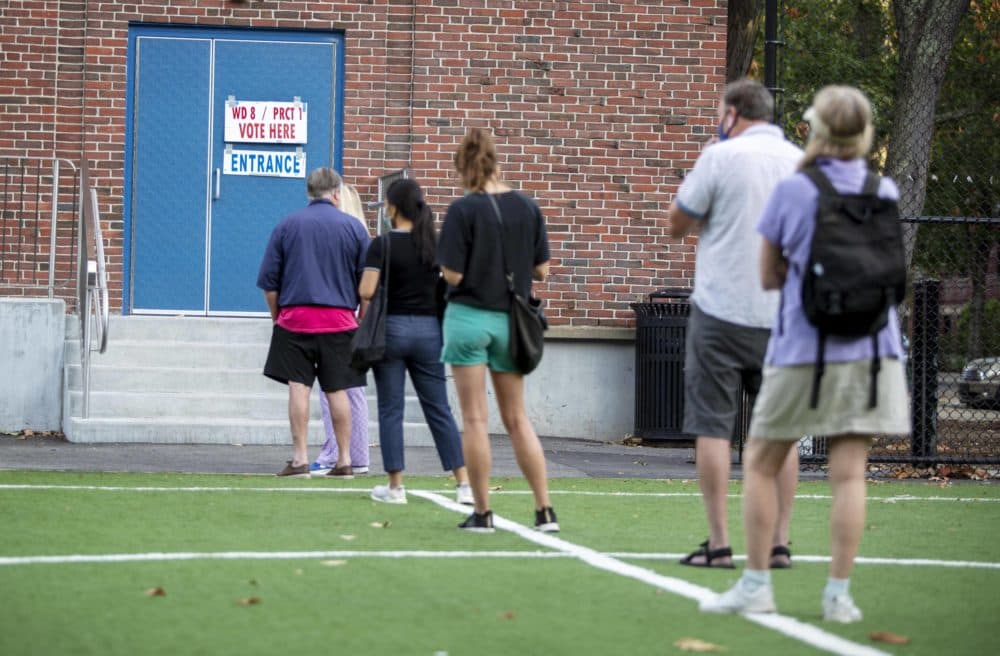Advertisement
Election 2020
What You Need To Know Before You Head To The Polls On Election Day

Maybe you're not among the hundreds of thousands of voters who've already cast their ballot in Massachusetts and instead, you're looking forward to voting in-person on Election Day.
If so, we've got you covered.
Polls in Massachusetts open for registered voters Tuesday at 7 a.m. and close at 8 p.m. Same-day registration is not permitted in Massachusetts. Be sure to check the location of your polling place before you leave to vote, and don't forget your face covering. Voters and election workers are being encouraged to mask up and observe social distancing guidelines for public safety.
As if living during a pandemic weren't stressful enough, heated political rhetoric leading up to Election Day is fueling even more tension. President Trump is sowing unfounded seeds of doubt, saying Democrats will "steal" the election and calling on his supporters to "go into the polls and watch very carefully."
So, before you head out to the polls, here are a few other things you should know:
What Not To Wear
Don't show up wearing your favorite campaign T-shirt, hat or pins and expect to be able to cast your vote. Wearing anything into the poll that can be considered supportive of one candidate over another or favoring or opposing a ballot question can be seen as a form of electioneering.
In order to keep the voting process free from intimidation — allowing individuals to cast their ballot in a campaign-free zone — most states have laws designating the distance from a polling place in which people are allowed to hoist a campaign sign or sport partisan fashions.
In Massachusetts, electioneering is prohibited anywhere within 150 feet from the entrance of a polling place. Most sites will have ropes or some other line marking the distance. As long as you're standing 150 feet or farther from the polling place, then you can legally wave campaign signs and wear all your favorite campaign flair.
Who Can Observe The Voting Process
Every state has different policies when it comes to who can observe the voting process inside a polling place, and in Massachusetts, that right is reserved for anyone who agrees to stay outside of the parameter established by election workers.
Generally speaking, there are four categories of observers who you might see strolling through your polling place:
- Partisan citizen observers: These observers are aligned with a specific candidate or party and are often looking out for the best interest of their campaign.
- Nonpartisan citizen observers: Many nonpartisan organizations throughout the country train volunteers to observe the voting process in order to help ensure voting rights are protected.
- International nonpartisan observers: International organizations dedicate non-citizen volunteers to monitor an election, studying the process and collecting data while having no vested interest in the outcome.
- Academic observers: Professors and scholars representing universities observe elections to study the democratic process.
Advertisement
Poll watching or observing on Election Day promises to be particularly interesting. As in years past, the Department of Justice will have staff from its civil rights division in several Massachusetts cities on Election Day, monitoring for compliance with the Voting Rights Act. According to a DOJ press release, observers will be in Boston, Lowell, Malden, Quincy and Springfield. Each of these cities are required by law to provide voting information in multiple languages.
And as a result of the president's plea to his supporters to serve as poll watchers, and in the midst of a particularly partisan election year, election officials across the country expect the potential for record levels of observers. Social distancing inside polling places might hamper how many observers are allowed inside at a given time, and police and other authorities will be standing by to respond to disputes across the country. In Massachusetts, law enforcement officials statewide are coordinating efforts to address any problems that may bubble up on Election Day.
Rep. Antonia Cabral, of New Bedford, filed a bill in September aimed at prohibiting sheriffs and their deputies from showing up at polling places to maintain order unless specifically requested by local election officials. Bristol County Sheriff Thomas Hodgson, whose jurisdiction falls within Cabral's district, served as an honorary chair on Trump's re-election campaign in Massachusetts. The bill remains in committee, meaning it likely won't take effect by Election Day.
Where You Can — And Cannot — Bring Your Gun
There are no additional regulations on Election Day regarding the right to carry a firearm inside polling places. But keep in mind, carrying a firearm is not permitted in school zones, post offices, courthouses or federal buildings in Massachusetts, and those laws must still be observed.
What Can I Do If Something Goes Wrong At My Precinct?
If you believe you are registered to vote, but poll workers can't confirm it, you can cast a provisional ballot. You will be asked to provide identification first.
Each precinct will have an election warden assigned on Election Day. Ask to speak with them about your concerns. Or, you can call the Secretary of the Commonwealth's office at 1-800-462-VOTE.
You can also share your concerns with WBUR by being a part of ProPublica's Electionland Project.
Here’s how to sign up for messages and get in touch:
- SMS: Text the word VOTE, VOTA (for Spanish) or 投票 (for Chinese) to 81380 (standard text message rates apply).
- WhatsApp: Send the word VOTE, VOTA (for Spanish) or 投票 (for Chinese) to 1-850-909-8683.
- Facebook Messenger: Go to m.me/electionland.
This article was originally published on October 29, 2020.
